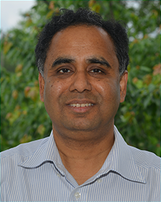
Rapid, Non-Destructive Detection of Counterfeit Integrated Circuits Using a Microwave Resonant Cavity System
Aditya Nechiyil [ResCav LLC]
Abstract:
Co-authors: Robert Lee and Gregg Chapman
The increasing prevalence of counterfeit integrated circuits (ICs) in critical systems has underscored the need for rapid, non-destructive screening methods. This study presents recent findings from the Resonant Cavity (ResCav) System—a fast, non-contact technique that evaluates IC authenticity by analyzing their electromagnetic (EM) signature. The system uses a microwave resonant cavity coupled with a vector network analyzer (VNA) to measure scattering parameters over a wide frequency band. These signatures are influenced by the structural, electrical, and material properties of the IC placed inside the system.
Two case studies are presented. The first involves a baseline group and five tampered groups of ICs provided by the Air Force Research Laboratory (AFRL), where die-level modifications were introduced by altering the graphic design system (GDSII) files before fabrication. The ResCav System successfully distinguished the tampered ICs using binary supervised classifiers, achieving average F1 scores greater than 0.98. However, one-class classifiers trained only on the baseline group were less effective. The second study explores how ionizing radiation exposure affects the EM signature of ICs, with results showing a correlation between changes in the EM signature and shifts in input offset voltage and supply current.
To assess measurement repeatability and robustness, intra-system variation testing was conducted by measuring signature variations due to repeated IC placement and monitoring stability as the VNA warmed from a cold start to thermal equilibrium. High intra system repeatability was observed across all test conditions, given a sufficient warm-up period.
This study demonstrates the potential of the ResCav System as a non-destructive screening tool capable of detecting subtle physical and structural changes in ICs. The system has limitations in detecting extremely small perturbations that may not significantly influence the EM response. Future work will explore the system's sensitivity limits to evaluate its applicability across additional counterfeit types, such as aged ICs.
Biography:
 Aditya Nechiyil earned his PhD in Electrical and Computer Engineering from The Ohio State University in May 2025, specializing in microwave resonant cavities, machine learning, and counterfeit IC detection. Previously, he interned as a machine learning research scientist at Expedia. Now, as the co-founder and CEO of ResCav, Aditya is focused on commercializing his research and has secured initial grant funding to support this effort. He serves as the Principal Investigator for a grant awarded through the AFRL Regional Network Midwest and is leading efforts to develop a commercial prototype of the ResCav system in collaboration with the Air Force Research Laboratory. The ResCav system provides a rapid and non-destructive solution for detecting counterfeit and tampered ICs.
Aditya Nechiyil earned his PhD in Electrical and Computer Engineering from The Ohio State University in May 2025, specializing in microwave resonant cavities, machine learning, and counterfeit IC detection. Previously, he interned as a machine learning research scientist at Expedia. Now, as the co-founder and CEO of ResCav, Aditya is focused on commercializing his research and has secured initial grant funding to support this effort. He serves as the Principal Investigator for a grant awarded through the AFRL Regional Network Midwest and is leading efforts to develop a commercial prototype of the ResCav system in collaboration with the Air Force Research Laboratory. The ResCav system provides a rapid and non-destructive solution for detecting counterfeit and tampered ICs.

Dr. Diganta Das
For more information or questions regarding the technical program (including Professional Development Courses), contact the Conference Chair, Dr. Diganta Das

Kristin Nafstad
For more information or questions regarding event logistics, exhibitions, and sponsorship, contact Kristin Nafstad.
Top